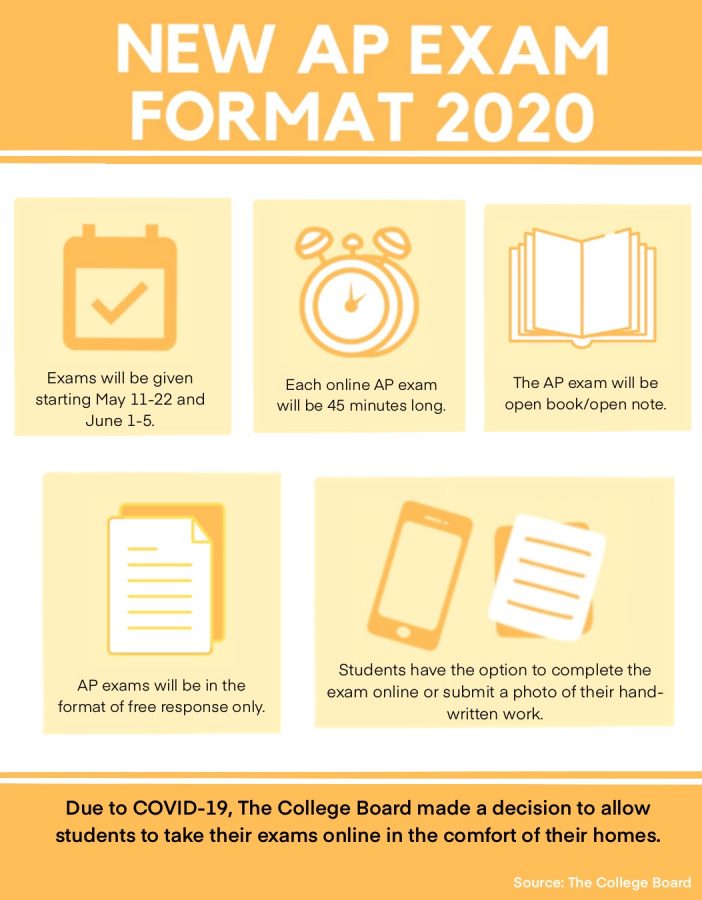College Board Sued for $500 Million after Unfair AP Exams
June 7, 2020
Amid nationwide controversy over unfair online testing, the College Board, commonly known for its AP and SAT system, is being sued for $500 million by students who were unable to submit their AP exam responses.
In early March, with the shutdown of schools and lockdowns plaguing the nation, the College Board surveyed 18,000 AP students to see if it should pursue online AP testing. Eager to obtain the college credit that they have been working toward all year, the students strongly encouraged the College Board to give them the opportunity to test. This news came as a surprise to many; with IB, SAT, and ACT testing cancelled, students were skeptical as to how AP was going to prove itself as an exception to the mass-cancellation, but were also determined to get the college credit that they deserve. “A lot of people have worked hard all year to try to earn credit,” began Junior Riley Coesens, who took two AP exams in May. “By implementing a temporary testing option, the College Board is still able to honor the dedication of high schoolers nationwide.”
When the AP testing schedule was released, it was revealed that each exam would last around 45 minutes (with a 5-minute submission period) with one or two different written prompts. Since most in-school AP exams would typically last up to three hours, the dramatic decrease in time worried students, since they felt it would be difficult to prove themselves worthy of passing the exam and showing what they had learned all year in that short amount of time. “I thought the exams would have been a bit longer,” explained Junior Ella Glaspie, who also took two AP exams. “When I was answering the questions, the time flew by.”
Additionally, the online AP exams featured no multiple-choice sections; instead, the exams were compiled of two parts of free-response questions. “I think that students who felt they were at an advantage with the writing portions of the exams could be benefitted by the online format,” said Coesens. “On the other hand, others may feel discouraged by it if they usually depend on multiple-choice questions to score higher.”
Perhaps the most concerning part about the newly designed AP exams was accessibility; students with poor internet connections or without computers or laptops that can be used for fast typing were put at a disadvantage and had difficulty finishing and turning in their responses. Compared to the typical AP exam setup, in which each student takes the test at the same time on paper, the online system was flawed and outraged those who were unsuccessful in submitting their responses. As a result, a federal class-action lawsuit against the organization hopes to prevent anyone who was unsuccessful from being forced to retake the test again in mid-June.
The suit argues that the online exams also violated the Americans with Disabilities Act, since it did not take into account the potential difficulties of disabled students when it came to completing and submitting the exams efficiently and on time.
This lawsuit mainly concerns those who took the AP tests administered in the first week of exams. The first week of testing was chaotic, with thousands of students having issues; videos went viral online of distressed students recording the unresponsive “submit” button as the timer to submit slowly went down to zero. The students who fell victim to week one’s connection problems had no other choice but to sign up to retake the exam 3 weeks later, whereas students who had difficulty in week two had the option to email their responses immediately after finishing the exam, avoiding the possibility of a retake altogether.
The College Board’s online AP exams are the perfect example of good intentions with a bad outcome. It is honorable that students were still given the opportunity to earn college credit, however, creating an alternative online exam for millions of students around the world is anything but easy, especially with such little time to prepare as COVID-19 quickly took over the nation. “Despite revenues of close to half a billion dollars a year from its AP program alone, the College Board failed to do what was necessary to make its at-home AP exams fair and accessible,” said attorneys Philip Baker and Marci Lerner Miller. “This is inexcusable in light of the unprecedented challenges faced by students and their families this year.”
